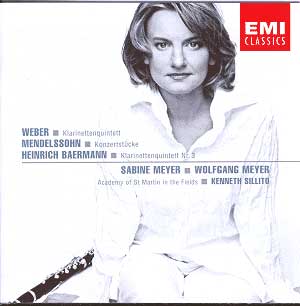Clive Brown’s informative and highly readable programme
notes give plenty of background to these three highly enjoyable works,
though whether the two quintets were sanctioned to be accompanied by
string orchestra rather than single strings in a chamber context is
not mentioned. He also makes the highly relevant point that so much
of this chamber music was written for a string quartet accompaniment
rather than for piano because it was hard to find decent instruments
when the players undertook tours - an essential part of their careers.
The Weber and Mendelssohn pieces were written for the virtuoso clarinettist
Baermann, the composer of the final work on the CD, who by all accounts
was a brilliant player, much as Richard Mühlfeld (a player favoured
by Brahms) who followed him. Sabine Meyer, briefly and controversially
Karajan’s principal clarinettist in the Berlin Philharmonic Orchestra
(remember the outrage from its male players?), upholds the tradition
today with her smooth, athletic technique and intensity of phrasing.
Weber called Baermann’s playing ‘godlike’, Mendelssohn described him
as ‘one of the best musicians I know’. Weber wrote all his works for
him (two concertos and a concertino) including this magical quintet
in 1815, and judging by its demands, Baermann must indeed have been
a fine virtuoso. Meyer’s playing of florid quiet passages is breathtaking,
and nor is this music pure froth either, the exciting finale with its
energetic accompaniment makes a rousing finish.
What might have been a CD featuring three very similar
composers from the same period (1780s-1847) is alleviated by the partnership
with Wolfgang Meyer (her brother?) as basset-horn soloist in the duo
works written by Mendelssohn for Baermann and his son Carl, who must
have been almost as gifted as his father. They were written in exchange
for a meal of steamed dumplings and cheese strudel which Mendelssohn
had enjoyed with the Baermanns in Munich - a culinary/musical bargain.
Each lasts barely over six minutes, but the music sparkles effervescently
and inventively with skilful counterpoint and lyrical tunes as their
strongest features, with no hint of heaviness induced by dumplings.
Finally Baermann reveals himself as a fairly accomplished
composer in a fascinating quintet, with reminiscences of Mozart (the
opening of the famous G minor Symphony No.40) and an Adagio notable
for a colourful string tremolando at one point, made more effective
here by being for a body of players rather than a string quartet. Like
the Weber quintet its finale has plenty of rhythmic vitality for Meyer
to get her tongue around.
A highly satisfying disc from all points of view with
the Academy of St Martin in the Fields on top form under violinist Kenneth
Sillito’s secure direction, but it’s Meyer (S) who is deservedly the
star.
Christopher Fifield


